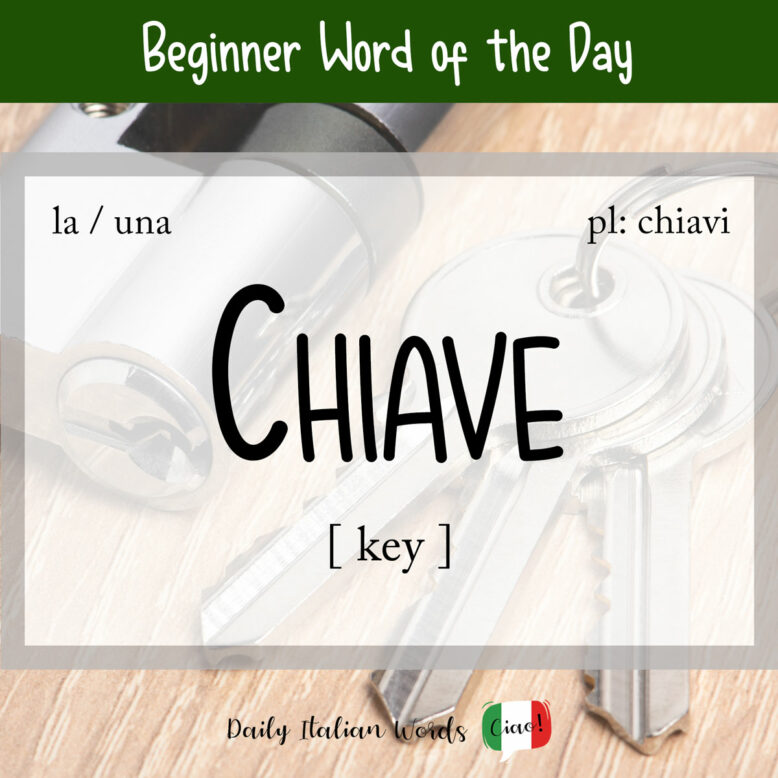Chiave is one of those words in Italian with multiple translations, but let’s begin by looking at the most diffused meaning which is key.

Chiave is a feminine noun. The plural is chiavi.
la chiave
una chiave
le chiavi
delle chiavi
Two kinds of keys you definitely don’t want to misplace are le chiavi di casa (house keys) and le chiavi della macchina (car keys).
Ho perso le chiavi di casa! Forse le ho lasciate in ufficio. Vado a controllare, sempre che io riesca a trovare le chiavi della macchina!
I’ve lost my house keys. Maybe I left them at the office. I’ll go and check, that is if I can find the car keys!

In Italian, there isn’t a single verb that equates to the English verb to lock. Instead, you must say chiudere a chiave which literally means to close with a key. Chiudersi a chiave, on the other hand, means to lock oneself in.
The hole into which you insert the key to unlock a door is simply called keyhole in English. In Italian, you can hear the direct translation buco della chiave but also buco della serratura, with serratura being the word for lock.
Non riesco ad infilare la chiave nella serratura. Mi sa che mi hanno dato quella sbagliata.
I can’t insert the key into the hole. I think they gave me the wrong one.

Below are a few expressions you may see used with chiave:
- mettere / tenere sotto chiave = to put under lock and key, to keep something safe or hidden, to protect someone to the point of limiting its freedom, to keep someone locked up in prison (also exists with the verb essere, to be)
- avere le chiavi del cuore di qualcuno = to be able to influence someone (lit. to have the keys to someone’s heart)
- chiavi in mano = turnkey (all-inclusive)
- chiavi della città = keys to the city
As in English, there are quite a few figurative meanings associated with the word chiave, the first of which is solution or answer.
Esprimere i propri sentimenti è spesso la chiave per risolvere i problemi coniugali.
Expressing one’s feelings is often the solution to solving marital issues.
A second figurative meaning is key, as in the means of achieving or understanding something. For example, the key to success translates as la chiave del successo.

Finally, it can denote a strategic point of access to a specific area.
Singapore fu la chiave per le attività commerciali della Compagnia Britannica delle Indie Orientali.
Singapore was the key for the trade activities of the British East India Company.
Chiave di lettura (lit. keys of reading) is a synonym for interpretazione (interpretation), especially when analysing a written work beyond its literal meaning.
Did you know that…?
The verb chiavare, which derives from chiave, is a vulgar slang term meaning “to have sex with someone.”
Next we have some computer and car terminology with the word chiave:
- chiave di ricerca = the sequence of keywords one write in a search engine such as Google to find information about a topic. Note that you can also use the literal translation parola chiave (singular) or parole chiave* (plural)
- chiave di accesso = a synonym for password, although Italians use the English term more often
- chiave USB / chiavetta USB = USB stick / dongle
- chiave telecomando / elettronica = key fob (remote locking device)
*Note: you may think there is a mistake in the term parole chiave because we kept chiave in its singular form rather than using its plural form chiavi, but this is not the case.
With the collocation of two nouns, the first word is the one that carries the real meaning, whereas the second has a figurative meaning. Therefore, the second word doesn’t agree in number with the first word. Other examples are studenti modello (role model students) or copie pirata (bootlegged copies).
Non trovo più la mia chiavetta USB. Dentro ci sono le chiavi di accesso di tutto l’ufficio. Sono nei guai!
I can’t find my USB stick. Inside there are all the office’s passwords. I’m in trouble!

In musical terminology, chiave is also the key or clef that forms the tonal basis of a piece of music. For example, the treble clef is la chiave di violino. Related to this meaning are the expressions in chiave (in key) and fuori chiave (out of key). The former is a reference to the overriding tone of a discussion or story (e.g. in chiave ironica = with an ironic tone) while the latter means to be off-key or off-topic.
Finally, a chiave inglese is a wrench or spanner, whereas a chiave di volta is the keystone of an arch. Figuratively, the latter also denotes the key point of a topic.
Heather Broster is a graduate with honours in linguistics from the University of Western Ontario. She is an aspiring polyglot, proficient in English and Italian, as well as Japanese, Welsh, and French to varying degrees of fluency. Originally from Toronto, Heather has resided in various countries, notably Italy for a period of six years. Her primary focus lies in the fields of language acquisition, education, and bilingual instruction.


